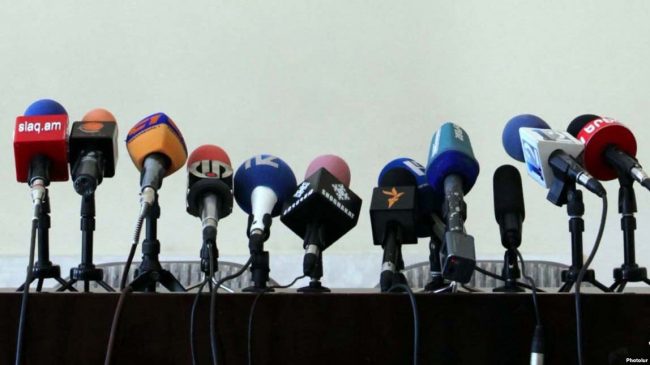To: Prime Minister of the Republic of Armenia, National Assembly of the Republic of Armenia
CC: National Security Service of the Republic of Armenia, Ministry of Justice of the Republic of Armenia, Ministry of High Tech Industry of the Republic of Armenia
Nations across Eastern Europe and Central Asia, and the world, must ensure people can access open, secure, and free internet when they need it the most — during important national events. We urge the Republic of Armenia to #KeepItOn.
Respected Prime Minister Nikol Pashinyan and National Assembly Speaker Alen Simonyan,
We, the undersigned organizations, and members of the #KeepItOn coalition — a global network of over 300 organizations from 105 countries working to end internet shutdowns — write to urgently appeal to you and all relevant authorities, to reject signing into law broad restrictions on the rights to freedom of expression and opinion outlined in Article 8 of On the Legal Regime of Martial Law and commit to maintaining unfettered access to internet for all, during both conflict and peacetime. Open, secure, reliable, and accessible internet is vital to exercising and protecting human rights, as well as ensuring safety during crises and conflicts.
Rising censorship in Armenia
Last year, around the time of the 13 September military offensive at the Azerbaijan-Armenia border, your government deliberately interfered with TikTok, making the popular app unavailable in Armenia. Authorities also blocked several Azerbaijani media outlets in the territory of Armenia.
On September 23, 2022, Media Diversity Institute – Armenia sent a request to the National Security Service of the Republic of Armenia to clarify the legal basis under which the authorities shut down and blocked access to TikTok and media websites. In January 2023, the National Security Service Director’s Chief of Staff defended your government’s actions by citing Article 15 of the Law on Security Services and claiming that this provision gives the government the power to “oversee information security matters.”
This justification is entirely inadequate, as Article 15 of the Law on Security Services provides no basis for either internet shutdowns or blockings of specific websites. The Chief of Staff’s official response, however, stated that there are ongoing discussions to also “adjust the legislation,” likely to give authorities such power. Any such changes would be a disaster for human rights online.
Alarmingly, in December 2022, the Armenian Ministry of Justice submitted draft amendments and supplements to “On the Legal Regime of Martial Law,” that would grant your government, under declaration of martial law, the power to restrict the right to freedom of expression and opinion through temporary blockings of websites, social media, internet applications, and through partial or complete internet shutdowns across the territory of the Republic of Armenia. The amendments also provide for temporary confiscation or seizure of media equipment such as printing devices and copiers, as well as radio broadcasting and sound amplifying equipment which would hinder the work of media and journalists. The new rules and procedures governing the use of communication means and accreditation of journalists also risk restricting freedom of press and free expression.
The #KeepItOn coalition joins Armenian civil society organizations and international NGOs such as the Committee to Protect Journalists in strongly opposing this legislation, which poses serious threat to the freedom of expression in Armenia and represents “an excuse to curtail press freedom.”
Impeding access to the internet harms human rights and safety
Unhampered internet connectivity is crucial for the protection of human rights such as freedom of opinion and expression, access to information, freedom of the press, and freedom of peaceful assembly. Restricting internet access in any manner disrupts the flow of information and hinders
reporting and accountability for human rights abuses.
Shutting or slowing down access to the internet directly interferes with all aspects of people’s daily lives including their ability to express views and opinions freely, communicate with loved ones, organize online openly and with no restrictions, access education and healthcare, and conduct business. Internet shutdowns make it extremely difficult for journalists, the media, and human rights defenders to carry out their work, thereby denying people both inside and outside of the affected country access to credible information.
Shutting down internet or social media access during conflicts and crises is disproportionate and amounts to collective punishment, depriving people of fundamental rights, including people’s right to political participation. This cannot be justified as a tactical response. Such measures indicate the intention to thwart free expression and control narratives. Authorities in Armenia are under an obligation to refrain from issuing orders that undermine international human rights standards. Private companies also have a responsibility to respect human rights that exist above and independent of domestic law.
International human rights frameworks condemn internet shutdowns
Interfering with internet connection to restrict people’s ability to communicate, express themselves, and receive adequate information during emergencies and crises is a violation of the fundamental right to freedom of expression, provided in Articles 19 of the Universal Declaration of Human Rights and the International Covenant on Civil and Political Rights (ICCPR). Internet shutdowns are strongly condemned in international convenings, including in the United Nations Human Rights Council Resolution 47/16 that denounces “the use of Internet shutdowns to intentionally and arbitrarily prevent or disrupt access to or dissemination of information.” The Human Rights Council in its recent report Internet shutdowns: trends, causes, legal implications and impacts on a range of human rights urges authorities to not impose internet shutdowns. Moreover, the UN High Commissioner for Human Rights stated that “switching off the internet causes incalculable damage, both in material and human rights terms” while “the costs to jobs, education, health and political participation virtually always exceed any hoped for benefit.”
According to Article 4 of the ICCPR, states may “take measures derogating from their obligations under the Covenant to the extent strictly required by the exigencies of the situation.” In the view of the UN Human Rights Committee, this requirement reflects “the principle of proportionality which is common to derogation and limitation powers.” In other words, “any derogation measure shall be such only as are strictly necessary to deal with the threat to the life of the nation and are proportionate to its nature and extent.” Internet shutdowns, by contrast, disproportionately impact all users, and unnecessarily restrict access to information and emergency services communications during crucial moments that makes them “disproportionate by default.”
The undersigned organizations and members of the #KeepItOn coalition join our partners in unequivocally condemning any attempts to legitimize online censorship and internet shutdowns, at any time. While Armenia is facing real and serious threats to its security posed by Azerbaijan, there is no legitimate reason to limit your own population’s access to the internet and social media, including platforms like TikTok.
We respectfully call on the Armenian government to remove the provisions in the Law “On the Legal Regime of Martial Law” curtailing internet and media freedom and bring the Law in full compliance with international human rights.
ORGANIZATIONS
Access Now
African Freedom of Expression Exchange (AFEX)
Africa Freedom of Information Centre (AFIC)
Africa Media and Information Technology Initiative (AfriMITI)
Africa Open Data and Internet Research Foundation
Amnesty International
Bloggers of Zambia
Blueprint for Free Speech
Centre for Community Empowerment and Development- Malawi
Center for Media Studies and Peacebuilding (CEMESP-Liberia)
Collaboration on International ICT Policy for East and Southern Africa (CIPESA)
Committee to Protect Journalists
Office of Civil Freedoms
Change Tanzania Movement
Digital Rights Kashmir
Digital Paradigm (Kazakhstan)
Eurasian Digital Foundation (Kazakhstan)
Factcheck.kz
Gambia Press Union (GPU)
Heartland Initiative
Human Constanta
Human Rights Centre Somaliland
Human Rights Consulting Group (Kazakhstan)
I4C Center for Artificial Intelligence and Human Rights
IFEX
Innovation For Change (I4C) South Asia
International Press Center
Internet Freedom Kazakhstan (ifkz.org)
Internet Policy Observatory Pakistan
Internet Protection Society (Russia)
Internet Sans Frontières
Igbanet (Africa)
JCA-NET(Japan)
KICTANet, Kenya
Kijiji Yeetu
Media Diversity Institute – Armenia
Media Foundation for West Africa (MFWA)
MediaNet (Kazakhstan)
Media Rights Agenda (MRA)
Miaan Group
Organization of the Justice Campaign- OJC
Open Observatory of Network Interference (OONI)
OpenNet Africa
Paradigm Initiative (PIN)
PEN America
PEN Armenia
Ranking Digital Rights
Roskomsvoboda
Sassoufit Collective
SMEX
Software Freedom Law Center, India
South East Europe Media Organisation (SEEMO)
Teplitsa. Technologies for Social Good (te-st.org)
The Tor Project
Ubunteam
YODET
Women of Uganda Network (WOUGNET)
Zaina Foundation

